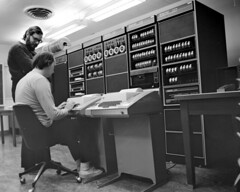Computer Programming and the Law: A New Research Agenda
By Kristopher A. Nelson
in
April 2009
300 words / 2 min.
Tweet
Share
Image by PanelSwitchman via Flickr Computer Programming and the Law: A New Research Agenda | Freedom to Tinker: By my best estimate, at least twenty different law professors on the tenure track at American law schools once held a job as a professional computer programmer. I am proud to say that two of us work […]
Please note that this post is from 2009. Evaluate with care and in light of later events.
 Image by PanelSwitchman via Flickr
Image by PanelSwitchman via Flickr
Computer Programming and the Law: A New Research Agenda | Freedom to Tinker:
By my best estimate, at least twenty different law professors on the tenure track at American law schools once held a job as a professional computer programmer. I am proud to say that two of us work at my law school.
Most of these hyphenate lawprof-coders rarely write any code today, and this is a shame. There are many good reasons why the world would be a better place if we began to integrate computer programming into legal scholarship (and more generally, into law and policy).
As a former professional computer programmer too, this interests me. Paul Ohm’s essay on SSRN goes into more detail:
This essay proposes a new interdisciplinary research agenda called Computer Programming and the Law. By harnessing the power of computer programming, legal scholars can develop better tools, data, and insights for advancing their research interests. This essay presents the case for this new research agenda, highlights some examples of those who have begun to blaze the trail, and includes code samples to demonstrate the power and potential of developing software for legal scholarship. The code samples in this essay can be run like a piece of software-thanks to a technique known as literate programming-making this the world’s first law review article that is also a working computer program.
I look forward to having a chance to read it.
![Reblog this post [with Zemanta]](http://img.zemanta.com/reblog_c.png?x-id=8b711be7-093f-4cf3-95bb-02832b303341)